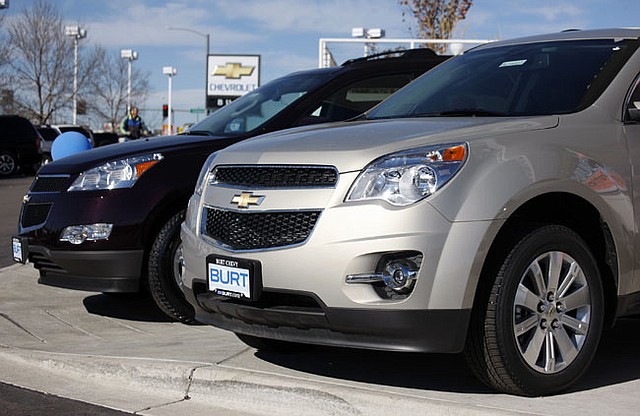GM likely to retake No. 1 sales spot from Toyota
Saturday, April 23, 2011
By TOM KRISHER and SHARON SILKE CARTY
AP Auto Writers
DETROIT - General Motors is almost certain to claim the title of world's biggest automaker this year, retaking the top spot from Toyota, which has been hurt by production problems since the Japanese earthquake and still can't escape the shadow of major safety recalls.
The No. 1 title, a morale booster for the winner's employees and managers, would cap GM's remarkable comeback from bankruptcy.
GM's sales are up, mainly in China and the U.S, the world's top two markets. Its cars are better than in the past, especially small ones.
But even though GM came within 30,000 sales of Toyota last year and began strong in 2011, any sales victory this year has more to do with Toyota's problems.
First, a series of big recalls has ballooned to 14 million vehicles worldwide and damaged Toyota's reputation for reliability. That has spurred loyal buyers to look at other brands.
Second, a March 11 earthquake and tsunami in Japan curbed Toyota's car production. On Friday, Toyota Motor Corp. said its factories worldwide won't return to full production until November or December. That means buyers across the globe may not be able to get the models they want. Already the crisis has cost the company production of 260,000 vehicles.
Last year, Toyota sold 8.42 million cars and trucks, barely ahead of a resurgent GM, which sold 8.39 million. GM held the No. 1 spot from 1932 until 2008.
Here's why GM is almost a lock to retake the lead this year:
A BETTER GM: General Motors Co. was dysfunctional three years ago, hobbled by enormous debt and a giant bureaucracy. Its quality was suspect, it lost billions, and it had few products other than pickups that buyers found appealing. After a government bailout, a leaner GM emerged from a 2009 bankruptcy with new vehicles and a focus on Chevrolet, Buick, GMC and Cadillac. Since then, GM has come up with hits including the Chevrolet Equinox small SUV, the Buick LaCrosse luxury car, and the Chevrolet Cruze compact. Its quality is better. Sales so far this year are up 25 percent in the U.S. and 10 percent in China. The efficient Cruze compact and Chevrolet Volt car both hit the market as U.S. gasoline prices started rising.
TOYOTA TROUBLES: Bad publicity from the recalls, mainly for cars that can accelerate without warning, was hurting Toyota long before the earthquake. The recalls began late in 2009, and came just as GM, Ford, Hyundai, and others introduced more competitive cars and trucks. With a bunch of nice alternatives and doubts about quality, customers who once dutifully returned to Toyota started considering other brands. Many Toyota models look old and need upgrades. Despite rebates and low-interest financing, Toyota was the only major automaker with lower U.S. sales last year. Sales are up 12.5 percent so far in 2011, but only at half the growth of GM.
Toyota is scrambling to keep factories open after the earthquake, and U.S. dealers expect to run out of some models. Already dealers are reporting shortages of the Prius gas-electric hybrid, a high-demand model because of gas prices.
Merle Gothard, general manager of North Park Toyota in San Antonio, says he's not worried about GM retaking the title because it still has a tarnished image from bankruptcy.
"It's important from a marketing standpoint," he says. "But Toyota has other things going for it." He notes that Toyota is still profitable and never took a dime of stimulus money from the government.
THE CHINA FACTOR: Toyota has nowhere near GM's presence in China, now the world's largest auto market. Through March, Toyota sold 208,000 vehicles there, but GM and its joint ventures sold more than three times that number. Growth in China by itself probably would have moved GM ahead of Toyota in worldwide sales. Toyota's lead was only about one day's worth of sales for GM.
CAVEATS: Toyota still has a loyal customer base that believes the cars are safe and will last forever. Many Toyotas run for hundreds of thousands of miles with little more than routine maintenance. It also has a reputation for fuel efficiency, led by the Prius.
GM would have to run into major problems to let No. 1 slip away this year. So far it has not been seriously hurt by parts shortages, but if some key electronic components from Japan can't be made elsewhere, the company could run short of models. A new management team also is pushing to speed up introduction of new models, and that could hurt quality.
If GM takes No. 1 this year, it won't crow much, says Jesse Toprak, vice president of industry trends and insights for TrueCar.com, an auto price tracking website.
"It's because of (factory) capacity restrictions, and that's not something they want to brag about," he says.
